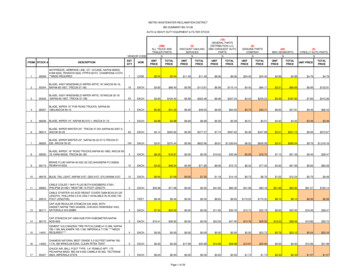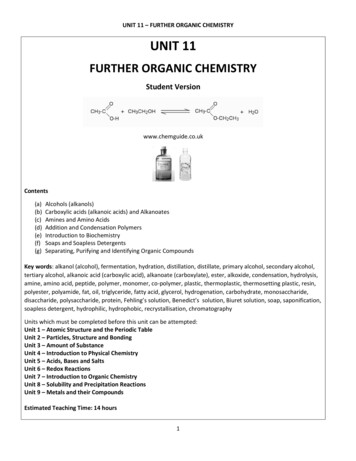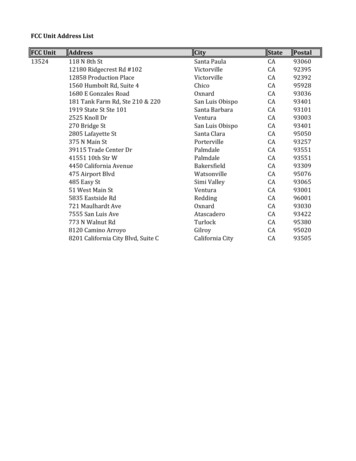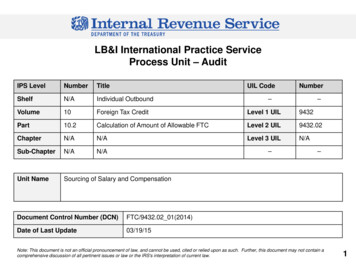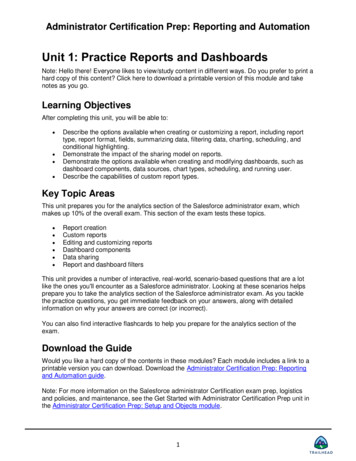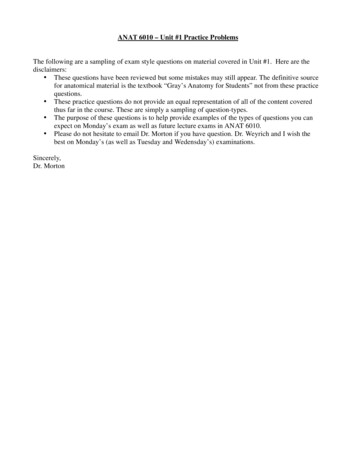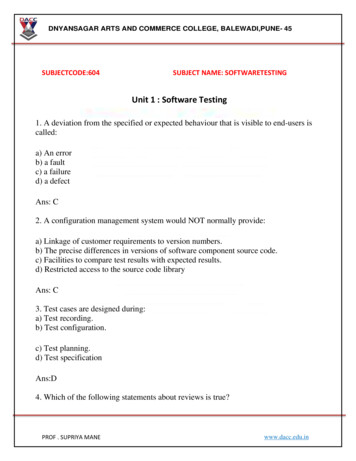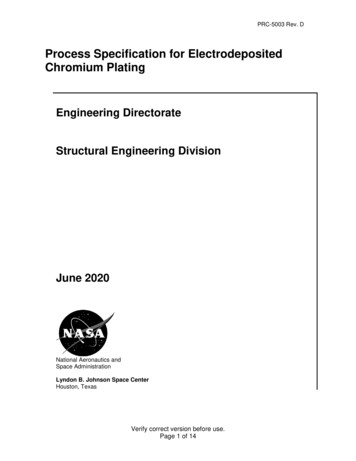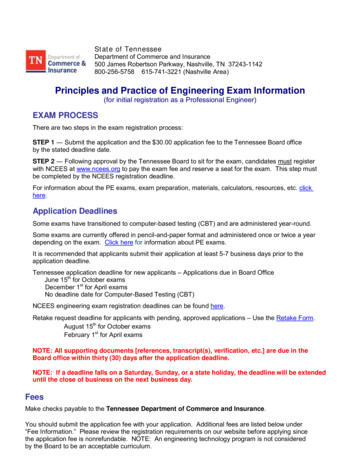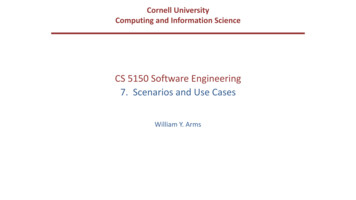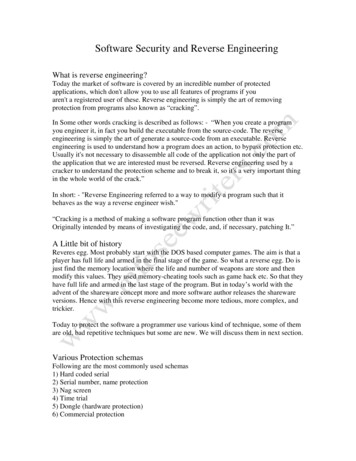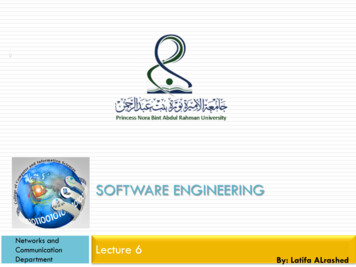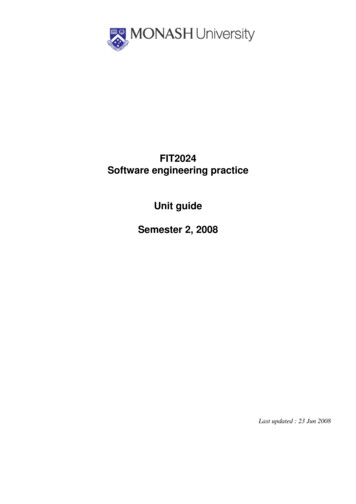
Transcription
FIT2024Software engineering practiceUnit guideSemester 2, 2008Last updated : 23 Jun 2008
Table of ContentsFIT2024 Software engineering practice - Semester 2 , 2008.1Unit leader :.1Lecturer(s) :.1Clayton.1Introduction.2Unit synopsis.2Learning outcomes.2Workload.2Unit nuous improvement.3Student Evaluations.3Improvements to this unit.3Unit staff - contact details.4Unit leader.4Lecturer(s) :.4Teaching and learning method.5Tutorial allocation.5Communication, participation and feedback.5Unit Schedule.5Unit Resources.7Prescribed text(s) and readings.7Recommended text(s) and readings.7Required software and/or hardware.7Equipment and consumables required or provided.7Study resources.8Library access.8Monash University Studies Online (MUSO).8Assessment.9Unit assessment policy.9Assignment tasks.9Examinations.11Assignment submission.11University and Faculty policy on assessment.12Due dates and extensions.12Late assignment.12Return dates.12Plagiarism, cheating and collusion.12Register of counselling about plagiarism.13Non-discriminatory language.13Students with disabilities.13Deferred assessment and special consideration.14
FIT2024 Software engineering practice - Semester 2 , 2008Unit leader :David SquireLecturer(s) :Clayton David SquireFIT2024 Software engineering practice - Semester 2 , 20081
FIT2024 Software engineering practice - Semester 2 , 2008IntroductionUnit synopsisThe focus in this unit is on the application of tools and techniques used by software engineers in the development ofsoftware systems. Students gain experience with the software process, particularly PSP, the Personal SoftwareProcess; estimation in project management; software metrics; software testing and debugging techniques; andsoftware maintenance. Students also gain an appreciation of project, quality, and configuration management.Programming concepts are revisited with more advanced problems and solutions focusing on the design,development, and testing of object-oriented systems. Case study work involves the development and maintenanceof a software system using the above software engineering techniques and object-oriented methods.Learning outcomesAt the completion of this unit students should have further developed their skills as software engineers and have adeeper appreciation of software engineering principles in the development and maintenance of computer systems;have further developed their skills in problem-solving and software measurement; recognise the role of, and be ableto use, specific software engineering tools and techniques such as quality plans, project plans, test plans, softwaremetrics models, configuration management tools and development environments in the software engineeringprocess; be able to measure their own improvement using the personal software process; have acquired anappreciation of the application of software engineering principles including software process, quality management,software metrics, configuration management, performance, testing and debugging, technical reviews, reusabilityand change management.WorkloadWorkload commitments are: two-hour lecture and two-hour tutorial (or laboratory) (requiring advance preparation) a minimum of 2-3 hours of personal study per one hour of contact time in order to satisfy the reading andassignment expectations.You will need to allocate up to 5 hours per week in some weeks, for use of a computer, including time fornewsgroups/discussion groups.Unit relationshipsPrerequisitesBefore attempting this unit you must have satisfactorily completed CSE1203 or (CSE1401 and CSE1303) orBUS2011, or equivalent. You should have knowledge of basic object-oriented programming and design.RelationshipsFIT2024 is a core unit in in the Bachelor of Software Engineering, and in the System Development major of theBachelor of ITS (Caulfield). It is a prerequisite for FIT3057 in the Bachelor of ITS.You may not study this unit and CSE2401, GCO3811, RDT2231, SFT2201, or CSE2201 in your degree.Introduction2
FIT2024 Software engineering practice - Semester 2 , 2008Continuous improvementMonash is committed to ‘Excellence in education' and strives for the highest possible quality in teaching andlearning. To monitor how successful we are in providing quality teaching and learning Monash regularly seeksfeedback from students, employers and staff. Two of the formal ways that you are invited to provide feedback arethrough Unit Evaluations and through Monquest Teaching Evaluations.One of the key formal ways students have to provide feedback is through Unit Evaluation Surveys. It is Monashpolicy for every unit offered to be evaluated each year. Students are strongly encouraged to complete the surveys asthey are an important avenue for students to "have their say". The feedback is anonymous and provides the Facultywith evidence of aspects that students are satisfied and areas for improvement.Student EvaluationsThe Faculty of IT administers the Unit Evaluation surveys online through the my.monash portal, although for somesmaller classes there may be alternative evaluations conducted in class.If you wish to view how previous students rated this unit, please go /Over the past few years the Faculty of Information Technology has made a number of improvements to its coursesas a result of unit evaluation feedback. Some of these include systematic analysis and planning of unitimprovements, and consistent assignment return guidelines.Monquest Teaching Evaluation surveys may be used by some of your academic staff this semester. They areadministered by the Centre for Higher Education Quality (CHEQ) and may be completed in class with a facilitatoror on-line through the my.monash portal. The data provided to lecturers is completely anonymous.Monquest surveys provide academic staff with evidence of the effectiveness of their teaching and identify areas forimprovement. Individual Monquest reports are confidential, however, you can see the summary results ofMonquest evaluations for 2006 at uest/profiles/index.htmlImprovements to this unitSome topics have been updated to reflect changes in the state-of-the art in this area. Some topics have beenenhanced with material previously taught in CSE3308, but not present in the new FIT3077.Continuous improvement3
FIT2024 Software engineering practice - Semester 2 , 2008Unit staff - contact detailsUnit leaderDr David SquireSenior LecturerPhone 61 3 990 59013Fax 61 3 990 55157Lecturer(s) :Dr David SquireSenior LecturerPhone 61 3 990 59013Fax 61 3 990 55157Unit staff - contact details4
FIT2024 Software engineering practice - Semester 2 , 2008Teaching and learning methodTutorial allocationOn-campus students should register for tutorials/laboratories using Allocate .Communication, participation and feedbackMonash aims to provide a learning environment in which students receive a range of ongoing feedback throughouttheir studies. You will receive feedback on your work and progress in this unit. This may take the form of groupfeedback, individual feedback, peer feedback, self-comparison, verbal and written feedback, discussions (on lineand in class) as well as more formal feedback related to assignment marks and grades. You are encouraged to drawon a variety of feedback to enhance your learning.It is essential that you take action immediately if you realise that you have a problem that is affecting your study.Semesters are short, so we can help you best if you let us know as soon as problems arise. Regardless of whetherthe problem is related directly to your progress in the unit, if it is likely to interfere with your progress you shoulddiscuss it with your lecturer or a Community Service counsellor as soon as possible.Unit ScheduleWeekTopicReferences/ReadingsKey dates1Introduction to EiffelPressman Ch 8.4; Meyer;Weiner; Walden; Jezequel2SE & Quality; EiffelPressman Ch 1, 26, 32;Meyer, Weiner, Walden,JezequelExercise 1 due3SE Process, PSP; EiffelPressman Ch 2, 3, 4, 13.7;Somerville Ch 4, 13.7, 28;Humphrey (1990);Humphrey (1995);Humphrey (1996);Humphrey (1998)Exercise 2 due4Specification; Configuration Management Pressman Ch 9, 27;Somerville Ch 29; Meyer;Weiner; Walden; JezequelExercise 3 due5Project & Quality Management; Testing;6UNIT TEST7Software MetricsPressman Ch 15,22;Stage 1-Planning dueSomerville pp 208-210, Ch26; Peters Ch 13, 14;Fenton8Software Maintenance; Software DesignPressman Ch 31.2;Somerville pp 492-498;Peters Ch 18; Pfleeger Ch11; Arthur; MeyerTeaching and learning methodPressman Ch 13-14, 21-27; Exercise 4 due; HandSomerville Ch 5, 23, 27;out AssignmentPfleeger Ch 3, 8, 9; Peters,Ch 4, 12; ISO9000; TickITStage1-Implementation due5
FIT2024 Software engineering practice - Semester 2 , 20089SQA & Reviews (PSP2)Pressman Ch 15.1, 26;Somerville Ch 2710Software ReusePressman p 32, Ch 9.5,30.4.3, 30.5.2; SomervilleCh 1811Software PerformancePressman Ch 13.6.4, 20.9;Pfleeger Ch 9.3Stage 2-Planning dueMid semester break12SE Tools13Semester ReviewUnit SchedulePressman pp 54 & sidebars Stage( see lecture notes);2-Implementation dueMaciaszek Ch 3; ParkinsonCh 1-26
FIT2024 Software engineering practice - Semester 2 , 2008Unit ResourcesPrescribed text(s) and readingsPressman, R. S., Software Engineering: A Practitioner's Approach, 6th Edition, McGraw-Hill, 2005. Text booksare available from the Monash University Book Shops. Availability from other suppliers cannot be assured. TheBookshop orders texts in specifically for this unit. You are advised to purchase your text book early. Other texts areavailable in the library.Recommended text(s) and readings Meyer, B., Object-Oriented Software Construction, 2nd Edition, Prentice-Hall, 1997. Pfleeger, S. L., Software Engineering Theory and Practice, 2nd Edition, Prentice Hall, 2001. Sommerville, I., Software Engineering 7th edition, Addison-Wesley, 2004. Humphrey, W.S., Introduction to the Personal Software Process, Addison Wesley 1997. Humphrey, W.S., A Discipline for Software Engineering, Addison Wesley 1995. Humphrey, W.S., Managing the Software Process, Addison Wesley 1990. Humphrey, W.S., Lovelace, M., Hoppes, R., Introduction to the Team Software Process, Addison Wesley,1998. Peters, J. S., Pedrycz, W., Software Engineering, An Engineering Approach, J Wiley, 2000. Wiener R.S., Introduction to Computer Science with Eiffel, Prentice Hall 1996.Further Reading: Bennett S, Skelton and Lunn, Schaum's Outlines UML, McGraw-Hill, 2001. Larman C, Applying UML and patterns, Prentice-Hall, 1999. Jacobson I, Booch G and Rumbaug J, The Unified Software Development Process , Addison-Wesley. Covey, S.R., The 7 Habits of Highly Effective People, Pocket Books, 1999. Brooks, F., The Mythical Man Month, Addison-Wesley, 1995.Required software and/or hardwareYou will need access to: EiffelStudio Available for MS Windows, Linux, and Mac OS X TortoiseSVN (for MS Windows only) or any other Subversion clientSoftware may be downloaded via the FIT2024 Blackboard website.On-campus students may use this software which is installed in thecomputing labs. Information about computer usefor students isavailable from the ITS Student Resource Guide in the Monash University Handbook.Equipment and consumables required or providedStudents may use the facilities available in the computing labs. Information about computer use for students isavailable from the ITS Student Resource Guide in the Monash University Handbook. You will need to allocate upto 8 hours per week for use of a computer, including time for newsgroups/discussion groups.Unit Resources7
FIT2024 Software engineering practice - Semester 2 , 2008Study resourcesStudy resources we will provide for your study are:The FIT2024 web site on Blackboard, where lecture slides, weekly tutorial requirements, assignment specifications,sample solutions and supplementary material will be posted.Other useful web sites are: Interactive Software Engineering (ISE) Eiffel Site: http://www.eiffel.com/ Eiffel newsgroup: comp.lang.eiffelLibrary accessThe Monash University Library site contains details about borrowing rights and catalogue searching. To learn moreabout the library and the various resources available, please go to http://www.lib.monash.edu.au. Be sure to obtaina copy of the Library Guide, and if necessary, the instructions for remote access from the library website.Monash University Studies Online (MUSO)All unit and lecture materials are available through MUSO (Monash University Studies Online). Blackboard is theprimary application used to deliver your unit resources. Some units will be piloted in Moodle. If your unit is pilotedin Moodle, you will see a link from your Blackboard unit to Moodle (http://moodle.monash.edu.au) and canbookmark this link to access directly. In Moodle, from the Faculty of Information Technology category, click onthe link for your unit.You can access MUSO and Blackboard via the portal: http://my.monash.edu.auClick on the Study and enrolment tab, then Blackboard under the MUSO learning systems.In order for your Blackboard unit(s) to function correctly, your computer needs to be correctly configured.For example: Blackboard supported browser Supported Java runtime environmentFor more information, please visit: nloadables-student.htmlYou can contact the MUSO Support by: Phone: ( 61 3) 9903 1268For further contact information including operational hours, please ts/contact.htmlFurther information can be obtained from the MUSO support tmlStudy resources8
FIT2024 Software engineering practice - Semester 2 , 2008AssessmentUnit assessment policyAssessment in this unit has two components:Component A: 50%Final Exam (30%) Unit Test and Exercises (20%) Component B: 50% Software Engineering Team Assignment, includingPlanning, Programming & Documentation (50%)To pass this unit you must: Attain 50% overall, and Attain at least 40% of the available marks in both Components A & B, and At
4 Specification; Configuration Management Pressman Ch 9, 27; Somerville Ch 29; Meyer; Weiner; Walden; Jezequel Exercise 3 due 5 Project & Quality Management; Testing; Pressman Ch 13-14, 21-27; Somerville Ch 5, 23, 27; Pfleeger Ch 3, 8, 9; Peters, Ch 4, 12; ISO9000; TickIT Exercise 4 du
